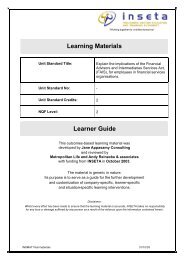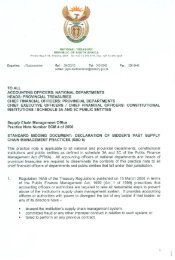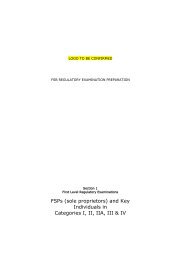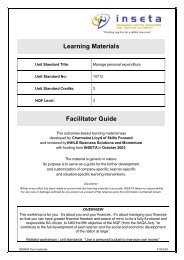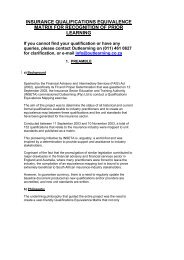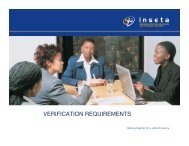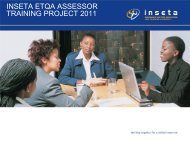SSP Brochure:Layout 1 - INSETA
SSP Brochure:Layout 1 - INSETA
SSP Brochure:Layout 1 - INSETA
You also want an ePaper? Increase the reach of your titles
YUMPU automatically turns print PDFs into web optimized ePapers that Google loves.
5.3 Support to small levy paying and non-levy paying firmsThe NSDS specifically requires SETAs to provide skills development support to small levy paying and non-levy paying organisations (NSDSindicator 2.2). For this purpose the <strong>INSETA</strong> has developed a voucher system whereby small businesses can access skills developmentfunding. The voucher system allows organisations to obtain vouchers from the SETA and to exchange it for training that will enable themto improve the viability of their businesses.The <strong>INSETA</strong> also have various regional initiatives that are aimed at assisting the small organisations in the sector. These initiatives include:• The appointment of regional advisors who assist small organisations with the claiming of grants and with any other SETA-related matters• Regular regional forums where the <strong>INSETA</strong> interacts with its constituent organisations and where a wide array of skills development issuesare discussed• The institution of regional assessor forums where matters relating to the qualify assurance function of the SETA can be discussed anddealt with and• The training of skills development facilitators.During the <strong>SSP</strong> development process various other needs were identified. These include the need for information on the current skillsdevelopment terrain, the need for small employers to organise themselves in order to interact with training providers in a co-ordinatedmanner and the need for support with the implementation of learnerships.FAIS compliance and black economic empowerment remain burning issues in the sector – especially for the small brokerages. The <strong>INSETA</strong>will continue to support these businesses to become compliant and to increase the number of black brokers and financial advisors in thesector.5.4 Adult basic education and trainingThe NSDS aims at increasing the educational levels of the workforce and to substantially increase the number of workers who haveachieved at least ABET level 4 (NQF level 1).In previous chapters of this <strong>SSP</strong> it was indicated that the majority of workers in the formal levy paying component of this sector are highlyeducated. Only a small number of workers in elementary occupations are possibly potential candidates for ABET. However, it is suspectedthat a large number of informal sector workers, specifically people who sell assistance (funeral) policies could be candidates for ABET.(These people are also referred to as “runners”). According to the FAIS Fit and Proper requirements these workers, if they don’t have aNQF level 2 qualification, have to be competent in an appropriate NQF level 2 skills programme. For those who don’t have a NQF level1 qualification, ABET becomes a very important vehicle to obtain access to such a skills programme.The <strong>INSETA</strong> is currently in a process of determining the ABET needs in the sector. A major challenge is to identify the runners and toobtain their commitment and participation in ABET.5.5 National standard of good practiceOne of the ways in which the NSDS wants to promote and accelerate the quality of training in the workplace is by promoting theachievement of a national standard of good practice in skills development. The Survey of employment, Scarce and Critical Skills establishedthat only a very small percentage of companies in the sector are certified to a standard of good practice – 2.5% are certified to the ISO9001 standard and 2.5% to Investors in People. The majority of organisations were either not familiar with the concept of standards ofgood practice or did not have the resources to implement such standards.5.6 Stakeholder capacity buildingThe NSDS aims to improve stakeholder capacity to deliver on and commitment to the NSDS. The SETAs are responsible for capacitybuilding and the promotion of commitment within their own sectors.The <strong>INSETA</strong> has started with the training and development of members of the <strong>INSETA</strong> Board in respect of their roles and obligations asBoard members, good corporate governance in the SETA environment and the NSDS targets and objectives. It has also instituted a SDFtraining programme. Furthermore, the regional advisors and regional forums play an important role in building the capacity of stakeholders.<strong>INSETA</strong> Sector Skills Plan - page 42






